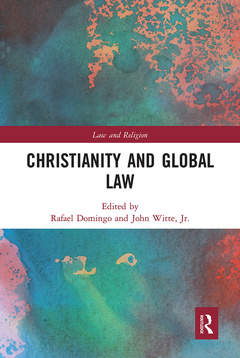Christianity and Global Law Law and Religion Series
Coordonnateurs : Domingo Rafael, Witte, Jr. John

This book explores both historical and contemporary Christian sources and dimensions of global law and includes critical perspectives from various religious and philosophical traditions.
Two dozen leading scholars discuss the constituent principles of this new global legal order historically, comparatively, and currently. The first part uses a historical-biographical approach to study a few of the major Christian architects of global law and transnational legal theory, from St. Paul to Jacques Maritain. The second part distills the deep Christian sources and dimensions of the main principles of global law, historically and today, separating out the distinct Catholic, Protestant, and Orthodox Christian contributions as appropriate. Finally, the authors address a number of pressing global issues and challenges, where a Christian-informed legal perspective can and should have deep purchase and influence. The work makes no claim that Christianity is the only historical shaper of global law, nor that it should monopolize the theory and practice of global law today. But the book does insist that Christianity, as one of the world?s great religions, has deep norms and practices, ideas and institutions, prophets and procedures that can be of benefit as the world struggles to find global legal resources to confront humanity?s greatest challenges.
The volume will be an essential resource for academics and researchers working in the areas of law and religion, transnational law, legal philosophy, and legal history.
Introduction
Part 1: Historical-biographical approach
1 St. Paul and the moral law
2 Augustine and the common good
3 Thomas Aquinas: definitions and vocabulary in his Treatise on Law
4 Francisco de Vitoria and the global commonwealth
5 Francisco Suárez on the law of nations and just war
6 Alberico Gentili and the secularization of the law of nations
7 Johannes Althusius and the universal rule of natural laws and rights
8 Hugo Grotius and the aking of modern natural law
9 Kant’s Religion and Perpetual Peace
10 Jacques Maritain and the Universal Declaration of HumanRights
11 Robert Schuman and the process of European integration
Part 2: Structural principles of global governance
12 Christianity and the global rule of law
13 Christianity and the principle of dignity
14 Christianity and the principle of equality in global law
15 The principle of the common good
16 Christianity, sovereignty, and global law
17 Christianity and the principle of solidarity
18 Christianity and the principle of subsidiarity
Part 3: Global issues and global public goods
19 Christianity and human rights
20 Christianity and the international economic order
21 Christianity and a global law for migration
22 Christianity, global environmental protection, and animal law
23 Christianity and the use of force: Lex and Pax Christi
24 Christianity and international criminal law
Rafael Domingo is the Spruill Family Professor of Law and Religion at Emory University, USA, and Alvaro d’Ors Professor of Law at the University of Navarra, Spain.
John Witte, Jr. is Robert W. Woodruff University Professor, McDonald Distinguished Professor of Religion, and Director of the Center for the Study of Law and Religion at Emory University, USA.
Date de parution : 12-2021
15.6x23.4 cm
Date de parution : 04-2020
15.6x23.4 cm
Thèmes de Christianity and Global Law :
Mots-clés :
Young Man; transnational legal theory; ICC Statute; world's great religion; West Germany; christianity; International Law; historical-biographical approach; Public International Law; Lex Aeterna; Vice Versa; Grotius; Hugo Grotius; Institut De Droit International; Global Law; Ius Gentium; International Humanitarian Law; Civil Society; Human Rights; Francisco De Vitoria; Political Common Good; Animal Law; Universal Moral Law; Sollicitudo Rei Socialis; Potentia Absoluta; Laudato Si; Ius Naturale; Rome Conference; Contemporary Natural Law Theories



